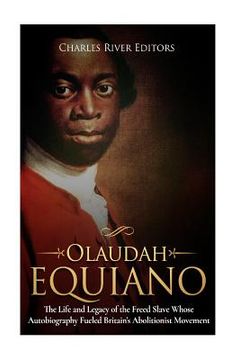Olaudah Equiano: The Life and Legacy of the Freed Slave Whose Autobiography Fueled Britain's Abolitionist Movement (in English)
Synopsis "Olaudah Equiano: The Life and Legacy of the Freed Slave Whose Autobiography Fueled Britain's Abolitionist Movement (in English)"
*Includes pictures *Includes Equiano's quotes about his life and work *Includes online resources and a bibliography for further reading "I believe there are few events in my life which have not happened to many; it is true the incidents of it are numerous, and, did I consider myself an European, I might say my sufferings were great; but when I compare my lot with that of most of my countrymen, I regard myself as a particular favorite of heaven, and acknowledge the mercies of Providence in every occurrence of my life." - Olaudah Equiano The slave trade that brought African captives to Europe and the Americas was established in the 15th century by merchants controlling Portugal's booming trade routes, but the perception of the non-white as an unconscious, undeveloped being had been prevalent in more ancient times. By the time Britain's European neighbors and the American colonies had fully invested in the African as a beast of burden fit only for servitude, little had changed over the parade of empires that had come and gone. Accounts of rhetorical exchanges and messages from the pulpits of the 17th century are said to have contested the idea of whether Africans were in possession of souls. In the minds of some, colonial slaves shared this distinction with women of any color. The movement to abolish slavery in Britain, the continent, and subsequently, the New World, began to gain traction with the British community by the early 18th century. This took place some years before similar uprisings in the Americas but was hampered by the fact that neither the typical Briton nor the average American ever saw the inner-workings of the slave trade world. The stealing of humans from the African coast, the domestic marketplace, and the infamously cruel shipment of human cargo to the West was not witnessed by most people, living apart as they did from the stealing, buying, and selling. Abolitionists, such as Thomas Clarkson and numerous others, took it upon themselves to break down the walls of the African myth and reveal to the white citizenry the slave trade's central process in graphic images and descriptions. Such an effort won its share of supporters over time, however, when an African man and freed slave wrote his own autobiographical narrative, speaking to learned audiences as their equal, the paradigm was rocked to its foundations. Olaudah Equiano challenged the image of the unconscious African beast with such intellect, philosophical refinement, public presence, and elegant writing, that standard British perceptions began to unravel. It is rational to assume that with his emergence as a respected world traveler, abolition of the slave trade was pushed forward by an incalculable number of years. Within his life, Equiano was to become the first black British politician, with a constituency of slaves and freemen enjoying representation for the first time in their cultural history. Equiano's written account of his birth and early childhood has been met with some controversy, and in the absence of written records, the precise details may never be known. That he lived much of his life as a slave is irrefutable, and many historians discount the importance of his early childhood. Equiano claims to have been born in the Eboe province of modern-day Nigeria, more specifically in Epsaka of the Igbo culture. Doubts over this claim stem from two written documents in what is now South Carolina in the U.S., one a birth record, the other a naval muster roll for an American ship. Various reasons are offered for their veracity or lack thereof, and several instances are cited under which Equiano might have found it necessary to alter his origins. Apart from these disagreements, everything else in the detailed autobiography is verifiable.

